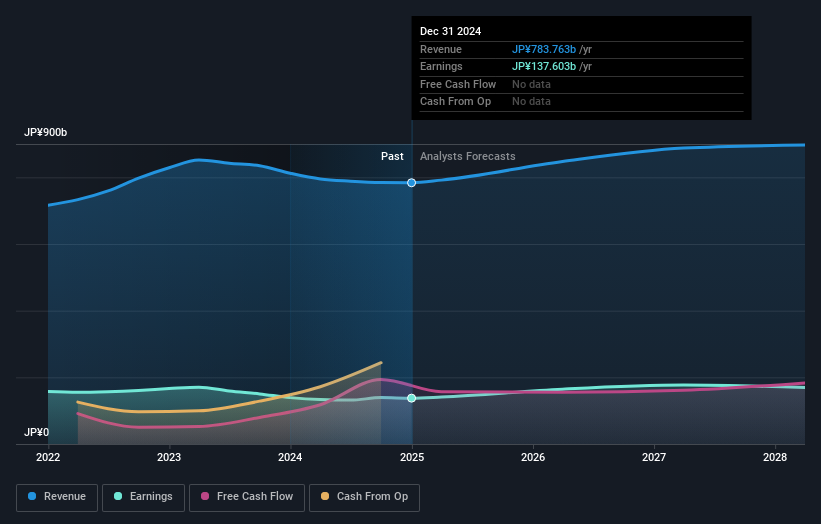Fanuc Corporation's (TSE:6954) latest 8.7% decline adds to one-year losses, institutional investors may consider drastic measures

Key Insights
- Significantly high institutional ownership implies Fanuc's stock price is sensitive to their trading actions
- The top 25 shareholders own 47% of the company
- Analyst forecasts along with ownership data serve to give a strong idea about prospects for a business
If you want to know who really controls Fanuc Corporation (TSE:6954), then you'll have to look at the makeup of its share registry. And the group that holds the biggest piece of the pie are institutions with 55% ownership. Put another way, the group faces the maximum upside potential (or downside risk).
And institutional investors endured the highest losses after the company's share price fell by 8.7% last week. The recent loss, which adds to a one-year loss of 19% for stockholders, may not sit well with this group of investors. Also referred to as "smart money", institutions have a lot of sway over how a stock's price moves. Hence, if weakness in Fanuc's share price continues, institutional investors may feel compelled to sell the stock, which might not be ideal for individual investors.
Let's take a closer look to see what the different types of shareholders can tell us about Fanuc.
View our latest analysis for Fanuc

What Does The Institutional Ownership Tell Us About Fanuc?
Institutions typically measure themselves against a benchmark when reporting to their own investors, so they often become more enthusiastic about a stock once it's included in a major index. We would expect most companies to have some institutions on the register, especially if they are growing.
As you can see, institutional investors have a fair amount of stake in Fanuc. This suggests some credibility amongst professional investors. But we can't rely on that fact alone since institutions make bad investments sometimes, just like everyone does. It is not uncommon to see a big share price drop if two large institutional investors try to sell out of a stock at the same time. So it is worth checking the past earnings trajectory of Fanuc, (below). Of course, keep in mind that there are other factors to consider, too.

Since institutional investors own more than half the issued stock, the board will likely have to pay attention to their preferences. Hedge funds don't have many shares in Fanuc. The company's largest shareholder is BlackRock, Inc., with ownership of 8.9%. In comparison, the second and third largest shareholders hold about 8.5% and 3.9% of the stock.
Our studies suggest that the top 25 shareholders collectively control less than half of the company's shares, meaning that the company's shares are widely disseminated and there is no dominant shareholder.
While studying institutional ownership for a company can add value to your research, it is also a good practice to research analyst recommendations to get a deeper understand of a stock's expected performance. There are a reasonable number of analysts covering the stock, so it might be useful to find out their aggregate view on the future.
Insider Ownership Of Fanuc
While the precise definition of an insider can be subjective, almost everyone considers board members to be insiders. The company management answer to the board and the latter should represent the interests of shareholders. Notably, sometimes top-level managers are on the board themselves.
I generally consider insider ownership to be a good thing. However, on some occasions it makes it more difficult for other shareholders to hold the board accountable for decisions.
Our information suggests that Fanuc Corporation insiders own under 1% of the company. As it is a large company, we'd only expect insiders to own a small percentage of it. But it's worth noting that they own JP¥436m worth of shares. In this sort of situation, it can be more interesting to see if those insiders have been buying or selling.
General Public Ownership
The general public-- including retail investors -- own 45% stake in the company, and hence can't easily be ignored. This size of ownership, while considerable, may not be enough to change company policy if the decision is not in sync with other large shareholders.
Next Steps:
I find it very interesting to look at who exactly owns a company. But to truly gain insight, we need to consider other information, too. For instance, we've identified 2 warning signs for Fanuc that you should be aware of.
Ultimately the future is most important. You can access this free report on analyst forecasts for the company .
NB: Figures in this article are calculated using data from the last twelve months, which refer to the 12-month period ending on the last date of the month the financial statement is dated. This may not be consistent with full year annual report figures.
New: AI Stock Screener & Alerts
Our new AI Stock Screener scans the market every day to uncover opportunities.
• Dividend Powerhouses (3%+ Yield)
• Undervalued Small Caps with Insider Buying
• High growth Tech and AI Companies
Or build your own from over 50 metrics.
Have feedback on this article? Concerned about the content? Get in touch with us directly. Alternatively, email editorial-team (at) simplywallst.com.
This article by Simply Wall St is general in nature. We provide commentary based on historical data and analyst forecasts only using an unbiased methodology and our articles are not intended to be financial advice. It does not constitute a recommendation to buy or sell any stock, and does not take account of your objectives, or your financial situation. We aim to bring you long-term focused analysis driven by fundamental data. Note that our analysis may not factor in the latest price-sensitive company announcements or qualitative material. Simply Wall St has no position in any stocks mentioned.
About TSE:6954
Fanuc
Provides factory automation products in Japan, the Americas, Europe, China, the rest of Asia, and internationally.
Flawless balance sheet with proven track record and pays a dividend.
Similar Companies
Market Insights
Community Narratives



